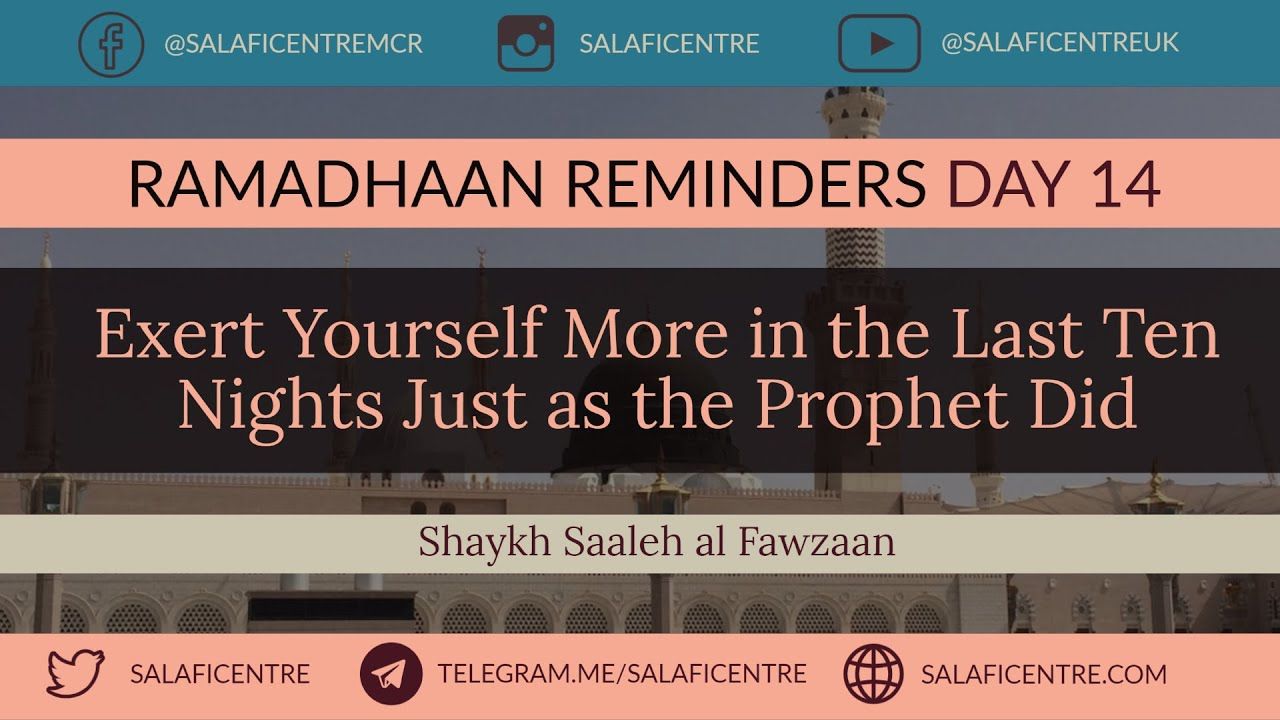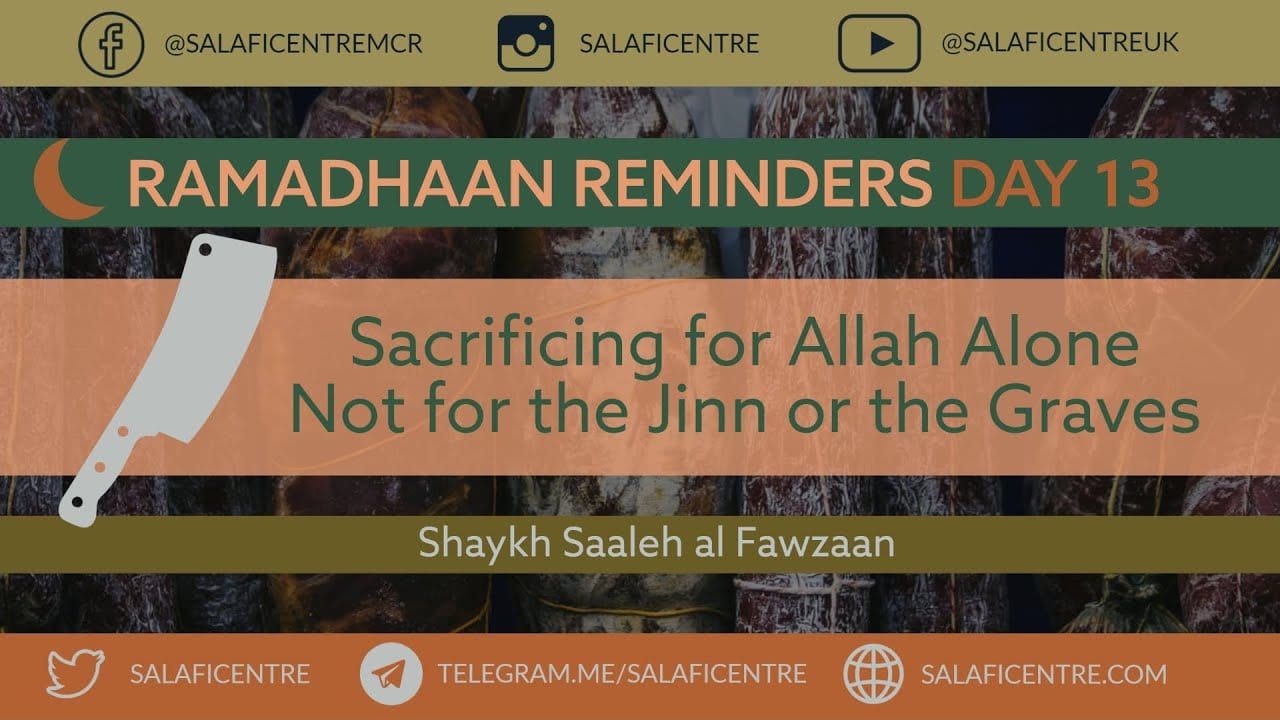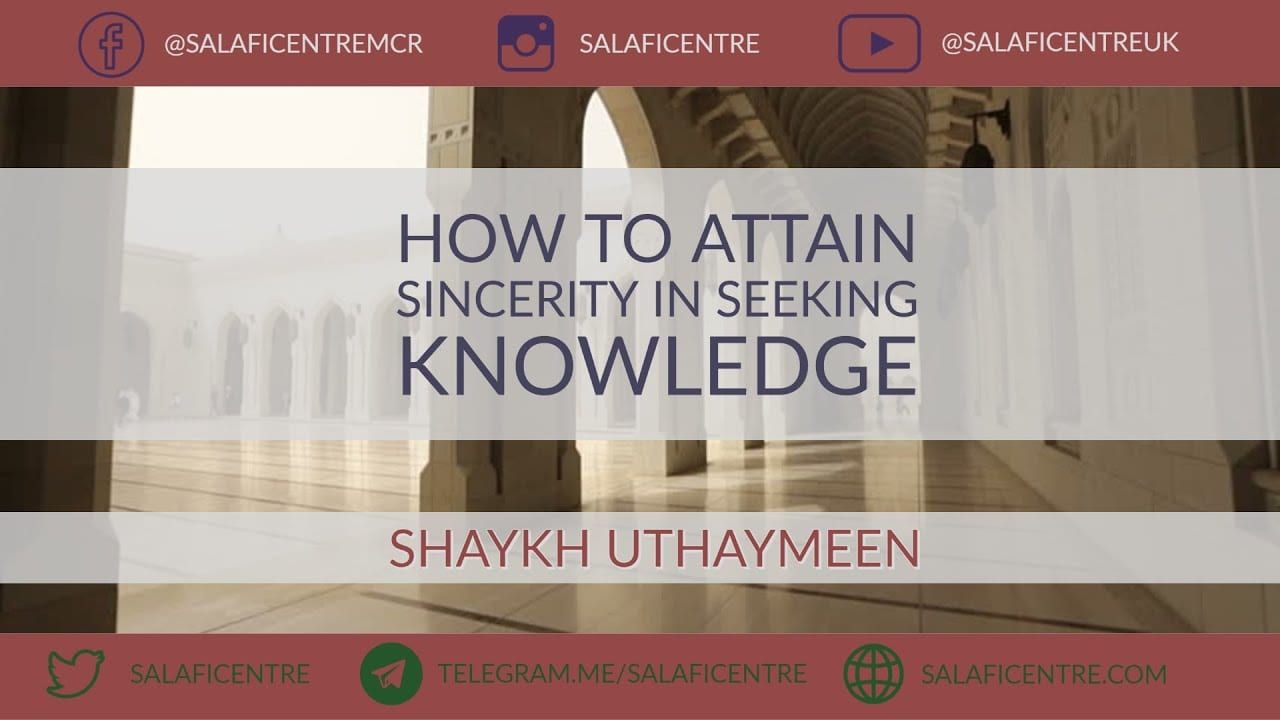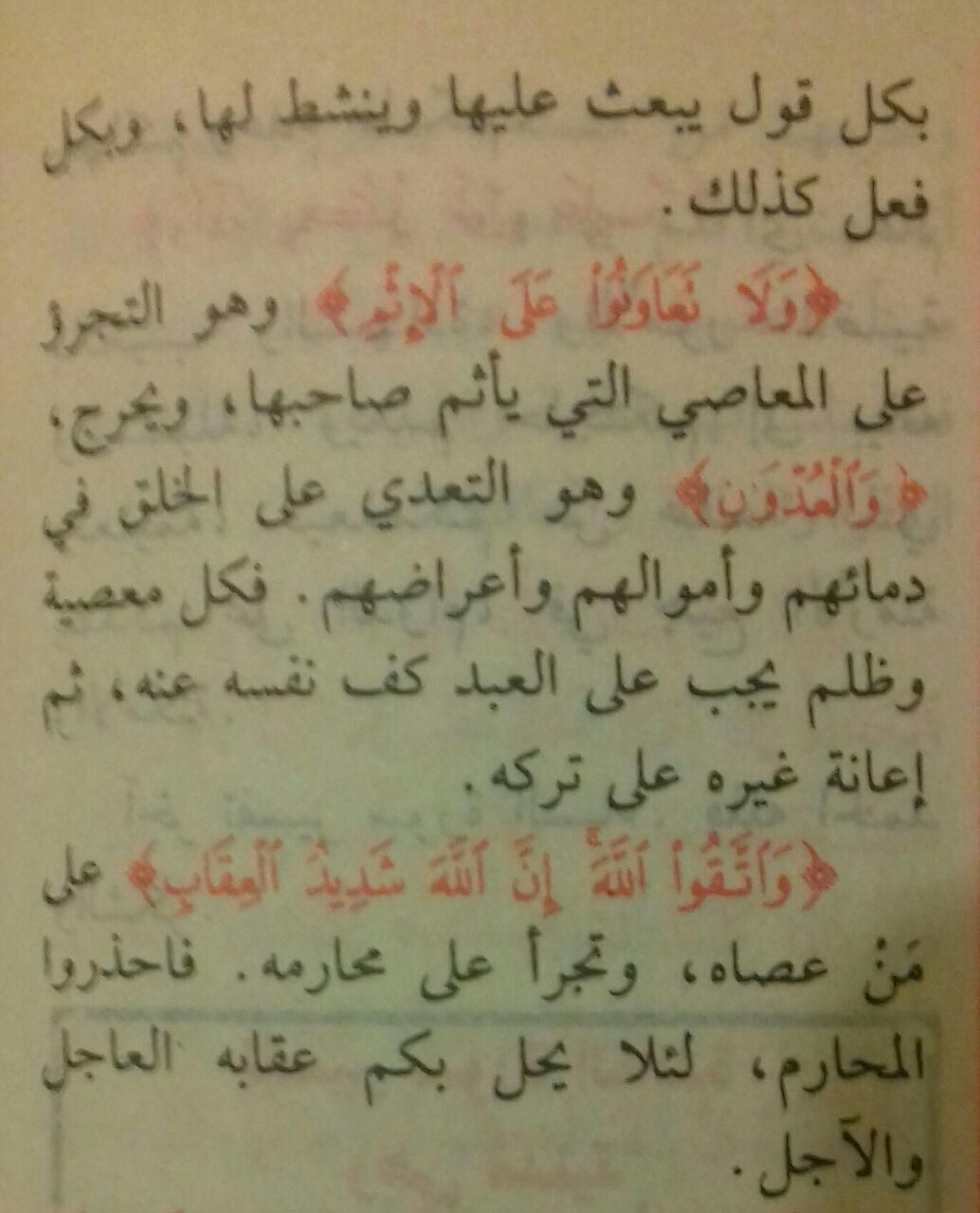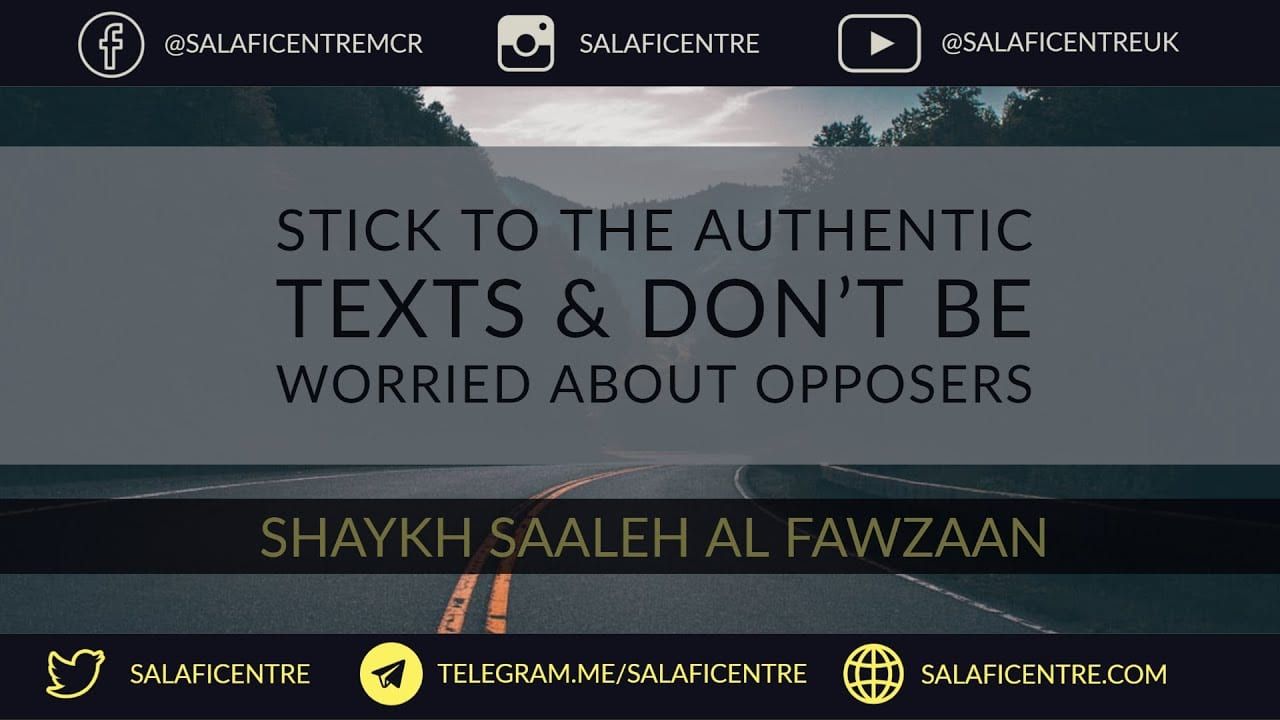In The Name of Allaah, The Most Merciful, The Bestower of Mercy.
Shaikh Saaleh Al-Fawzaan [may Allaah preserve him] said:
الحمد لله رب العالمين، وصلى الله وسلم على نبينا محمد خاتم الرسل، ومن تمسك بسنته وسار على نهجه الى يوم الدين
The rectification of every nation and its [upright] ascendancy is tied to the soundness of its Aqeedah and Afkaar [views or thoughts]; therefore, due to this reason, the Message of the Prophets [alayhimus salaatu was-salaam] came to rectify the Aqeedah [of the people]. So, the first thing every Messenger said to his people [was]: [ٱعۡبُدُواْ ٱللَّهَ مَا لَكُم مِّنۡ إِلَـٰهٍ غَيۡرُهُ- Worship Allah! You have no other Ilah (God) but Him. (La ilaha ill-Allah: none has the right to be worshipped but Allah)]. [Surah Al-A’raaf’ Aayah 59]
[Allaah (The Most High) said]: [وَلَقَدۡ بَعَثۡنَا فِى ڪُلِّ أُمَّةٍ۬ رَّسُولاً أَنِ ٱعۡبُدُواْ ٱللَّهَ وَٱجۡتَنِبُواْ ٱلطَّـٰغُوتَۖ – And verily, We have sent among every Ummah (community, nation) a Messenger (proclaiming): “Worship Allah (Alone), and avoid (or keep away from) Taghut (all false deities, etc. i.e. do not worship Taghut besides Allah)]”. [Surah An-Nahl’ Aayah 36]
And that is because Allaah [Glorified be He and free is He from all Imperfections] created the Khalq [i.e. Jinn and Mankind] to worship Him alone and not to associate anything as a partner with Him, just as [Allaah (The Most High)] said: [وَمَا خَلَقۡتُ ٱلۡجِنَّ وَٱلۡإِنسَ إِلَّا لِيَعۡبُدُونِ -And I (Allah) created not the jinns and humans except they should worship Me (Alone)]. [Surah Adh-Dhaariyaat’ Aayah 56]
Ibaadah [worship] is a right due to Allaah [alone] which His slaves must fulfil, just as the Prophet [sallal-laahu-alayhi-wasallam] said to Mu’aadh Bin Jabal [radiyallaahu-anhu]: “O Mu’adh, do you know what is the right of Allah upon His servants?” I said, “Allah and His Messenger know best.” The Prophet said, “To worship Him alone and to associate none in worship with Him. And do you know what is their right upon Him?” I said, “Allah and His Messenger know best.” The Prophet said, “Not to punish them if they do so.” [Bukhari]
The is the first and foremost Right [or obligation one must fulfil] without exception. Nothing else precedes it nor is precedence given to the rights of anyone [or the obligations owed to anyone] over it. Allaah [The Most High] said: [وَقَضَىٰ رَبُّكَ أَلَّا تَعۡبُدُوٓاْ إِلَّآ إِيَّاهُ وَبِٱلۡوَٲلِدَيۡنِ إِحۡسَـٰنًاۚ – And your Lord has decreed that you worship none but Him. And that you be dutiful to your parents]. [Surah Al-Israa’ Aayah 23]
قُلۡ تَعَالَوۡاْ أَتۡلُ مَا حَرَّمَ رَبُّڪُمۡ عَلَيۡڪُمۡۖ أَلَّا تُشۡرِكُواْ بِهِۦ شَيۡـًٔ۬اۖ وَبِٱلۡوَٲلِدَيۡنِ إِحۡسَـٰنً۬اۖ
Say (O Muhammad ): “Come, I will recite what your Lord has prohibited you from: Join not anything in worship with Him; be good and dutiful to your parents. [Sural Al-An’aam’ Aayah 151] [End of quote]
And regarding the statement of the Prophet [sallal-laahu-alayhi-wasallam]: What is the right of Allaah upon His slaves? This means that which [i.e. the obligations] Allaah has obligated on them. And regarding the statement of the Prophet [sallal-laahu-alayhi-wasallam]: What is the right of the slaves upon Allaah? Meaning: That which Allaah has obligated on Himself in dealing with them. The slaves cannot obligate anything, rather Allaah obligated it upon Himself as a blessing from Allaah bestowed upon His slaves.
Allaah [The Most High] said: [كَتَبَ رَبُّكُمۡ عَلَىٰ نَفۡسِهِ ٱلرَّحۡمَةَۖ أَنَّهُ ۥ مَنۡ عَمِلَ مِنكُمۡ سُوٓءَۢا بِجَهَـٰلَةٍ۬ ثُمَّ تَابَ مِنۢ بَعۡدِهِۦ وَأَصۡلَحَ فَأَنَّهُ ۥ غَفُورٌ۬ رَّحِيمٌ۬ – Your Lord has written Mercy for Himself, so that, if any of you does evil in ignorance, and thereafter repents and does righteous good deeds (by obeying Allah), then surely, He is Oft-Forgiving, Most Merciful]. [Surah Al-An’aam’ Aayah 54]
So, Allaah [Glorified be He and free is He from all imperfections] obligated on Himself that He will show mercy to the one who does evil in ignorance – meaning: out of foolishness and lack of good behaviour, but then he repents and does righteous deeds. And the meaning of [كتب in this Aayah] is [ أوجب – obligated]. [Al-Qawlul Mufeed Alaa Kitaabit Tawheed’ by Shaikh Uthaymeen [rahimahullaah]’ 1/46]
And due to the precedence given to this obligation [i.e. to worship Allaah alone and not to associate anyone or anything with Him in worship] over all other obligations, and since it is the basis of all the rulings of the religion, we find that the Prophet [sallal laahu alayhi wasallam] stayed in Makkah for thirteen years -calling the people to worship Allaah alone and negated all partners associated with Allaah in worship.
The majority of the Aayaat of the Noble Qur’aan established this affair of Tawheed and negated all the doubts held by the people regarding it. Every performer of the prayer, whether whilst performing an obligatory or optional prayer, has made a covenant with Allaah that he [or she] will establish this affair when he [or she] says: [إِيَّاكَ نَعۡبُدُ وَإِيَّاكَ نَسۡتَعِينُ – You (Alone) we worship, and You (Alone) we ask for help (for each and everything). This great obligation is called Tawheed Al-Ibaadah [i.e. to single out Allaah in worship]
Ibn Abbaas [radiyallaahu-anhumaa] said: “There were ten generations between Nuh and Aadam – all of them used to be upon the true path [i.e. upon the sound Aqeedah of Tawheed and worship]. [Ref 1] Al-Allaamah Ibnul Qayyim [rahimahullaah] said, “This is the correct statement regarding the Aayah” and then he mentioned – from the Qur’aan – that which supports this statement. [Ref 2]
Shirk first started amongst the people of Nuh when they exaggerated [or went beyond bounds regarding the status] of the righteous people and turned away from the call of their Prophet [Nuh] out of pride. [Allaah said that Nuh said that his people said]: [وَقَالُواْ لَا تَذَرُنَّ ءَالِهَتَكُمۡ وَلَا تَذَرُنَّ وَدًّ۬ا وَلَا سُوَاعً۬ا وَلَا يَغُوثَ وَيَعُوقَ وَنَسۡرً۬ا – And they have said: ‘You shall not leave your gods, nor shall you leave Wadd, nor Suwa’, nor Yaghuth, nor Ya’uq, nor Nasr] [Ref 3]
Al-Bukhaari [rahimahullaah] said: It has been narrated from Ibn Abbaas [radiyallaahu -anhumaa] that these were the names of pious people amongst the people of Nuh, and when they died, shaytaan inspired their people to (prepare) and place idols at the places where they used to sit, and to call those idols by their names. They did so, but did not worship them until those people (who initiated them) had died and the origin of the idols had become obscure, whereupon people began worshipping them. [Ref 4]
Indeed, Tawheed is of two types: Tawheed Fil Ma’rifah Wal Ith’baat and it is Tawheed Ar-Ruboobiyyah [Ref 5], which includes affirmation that Allaah alone is the Creator, the One in control over the entire affairs of the universe, the giver of life and death, the One who bestows all good and repels harm. The polytheists used to affirm [this category of Tawheed] even though they associated partners with Allaah in worship, just as Allaah [The Most High] stated about them:
قُلۡ مَن يَرۡزُقُكُم مِّنَ ٱلسَّمَآءِ وَٱلۡأَرۡضِ أَمَّن يَمۡلِكُ ٱلسَّمۡعَ وَٱلۡأَبۡصَـٰرَ وَمَن يُخۡرِجُ ٱلۡحَىَّ مِنَ ٱلۡمَيِّتِ وَيُخۡرِجُ ٱلۡمَيِّتَ مِنَ ٱلۡحَىِّ وَمَن يُدَبِّرُ ٱلۡأَمۡرَۚ فَسَيَقُولُونَ ٱللَّهُۚ فَقُلۡ أَفَلَا تَتَّقُونَ
Say (O Muhammad): “Who provides for you from the sky and from the earth? Or who owns hearing and sight? And who brings out the living from the dead and brings out the dead from the living? And who disposes the affairs?” They will say: “Allah.” Say: “Will you not then be afraid of Allah’s Punishment (for setting up rivals in worship with Allah)?” [Surah Yoonus’ Aayah 31]
The likes of these Aayaat are many and in them are clear clarifications that the polytheists used to affirm this category of Tawheed, but they used to wilfully deny the other category- Tawheed Al Ibaadah, which is to single out Allaah in Talab and Qasd [Ref 6] in every act of worship, and this necessitates the statement ‘there is no deity worthy of worship except Allaah’.
And because of this, the Prophet [sallal laahu alayhi wasallam] asked the polytheists to testify and believe that there is no deity worthy of worship except Allaah, but [Allaah said that they replied]: [أَجَعَلَ ٱلۡأَلِهَةَ إِلَـٰهً۬ا وَٲحِدًاۖ إِنَّ هَـٰذَا لَشَىۡءٌ عُجَابٌ۬- Has he (i.e. Muhammad-sallal laahu alayhi-wasallam) made the aliha (gods) (all) into One Ilah (God – Allah). Verily, this is a curious thing!” [Surah Saad’ Aayah 5]
[That is] because they knew that whoever says this [i.e. Laa ilaaha Ilal laah], then indeed he has acknowledged that everything worshipped besides Allaah is false and affirmed that only Allaah has the right to be worshipped; because the meaning of Al-Ilaa [i.e. god] is Al-Ma’bood [i.e. an object of worship]. As for worship, it is a comprehensive term for everything that Allaah loves and is pleased with- [including] statements and actions, whether inward [i.e. acts of worship of the heart, such as love, fear, hope etc] or outward [i.e. apparent acts of worship carried out by the limbs].
Therefore, whoever utters this statement Laa Ilaaha illal laah [i.e. there is no deity worthy of worship except Allaah], but then he invokes others besides Allaah, indeed he has contradicted himself. An affirmation of Tawheed Ar-Ruboobiyyah [ i.e. that Allaah alone is the Creator, the One in control over the entire affairs of the universe, the giver of life and death, the One who bestows all good and repels harm] necessitates that a person should also affirm in his heart and by way of his actions that Allaah alone is the deity worthy of worship. And due to this, the Messengers used to command their nations to affirm that Allaah alone is the deity worthy of worship by reminding them about what they have already affirmed regarding Tawheed Ar-Ruboobiyyah, just as Allaah [The Most High] said: [ذَٲلِڪُمُ ٱللَّهُ رَبُّكُمۡۖ لَآ إِلَـٰهَ إِلَّا هُوَۖ خَـٰلِقُ ڪُلِّ شَىۡءٍ۬ فَٱعۡبُدُوهُۚ وَهُوَ عَلَىٰ كُلِّ شَىۡءٍ۬ وَڪِيلٌ۬ – Such is Allah, your Lord! La ilaha illa Huwa (none has the right to be worshipped but He), the Creator of all things. So, worship Him (Alone), and He is the Wakil (Trustee, Disposer of affairs, Guardian, etc.) over all things]. [Surah Al-An’aam’ Aayah 102]
[Allaah (Th Most High) said]: [وَلَٮِٕن سَأَلۡتَهُم مَّنۡ خَلَقَ ٱلسَّمَـٰوَٲتِ وَٱلۡأَرۡضَ لَيَقُولُنَّ ٱللَّهُۚ قُلۡ أَفَرَءَيۡتُم مَّا تَدۡعُونَ مِن دُونِ ٱللَّهِ إِنۡ أَرَادَنِىَ ٱللَّهُ بِضُرٍّ هَلۡ هُنَّ كَـٰشِفَـٰتُ ضُرِّهِۦۤ أَوۡ أَرَادَنِى بِرَحۡمَةٍ هَلۡ هُنَّ مُمۡسِكَـٰتُ رَحۡمَتِهِۦۚ – And verily, if you ask them: “Who created the heavens and the earth?” Surely, they will say: “Allah (has created them).” Say: “Tell me then, the things that you invoke besides Allah, if Allah intended some harm for me, could they remove His harm, or if He (Allah) intended some mercy for me, could they withhold His Mercy?] [Surah Az-Zumar’ Aayah 38] [Refs 5 & 6: see article for further detail: http://www.salafipublications.com/sps/sp.cfm?subsecID=MNJ07&articleID=MNJ070003&articlePages=1 ]
The first command in the Mus’haf is the statement of Allaah [The Most High]:
يَـٰٓأَيُّہَا ٱلنَّاسُ ٱعۡبُدُواْ رَبَّكُمُ ٱلَّذِى خَلَقَكُمۡ وَٱلَّذِينَ مِن قَبۡلِكُمۡ لَعَلَّكُمۡ تَتَّقُونَ
ٱلَّذِى جَعَلَ لَكُمُ ٱلۡأَرۡضَ فِرَشً۬ا وَٱلسَّمَآءَ بِنَآءً۬ وَأَنزَلَ مِنَ ٱلسَّمَآءِ مَآءً۬ فَأَخۡرَجَ بِهِۦ مِنَ ٱلثَّمَرَٲتِ رِزۡقً۬ا لَّكُمۡۖ فَلَا تَجۡعَلُواْ لِلَّهِ أَندَادً۬ا وَأَنتُمۡ تَعۡلَمُونَ
O mankind! Worship your Lord (Allah), Who created you and those who were before you so that you may become Al-Muttaqun (the pious) – Who has made the earth a resting place for you, and the sky as a canopy, and sent down water (rain) from the sky and brought forth therewith fruits as a provision for you. Then do not set up rivals unto Allah (in worship) while you know (that He Alone has the right to be worshipped). [Surah Al-Baqarah’ Aayaat 21-22]
The statement ‘There is no deity worthy of worship except Allaah’ necessitates ‘negation’ and ‘affirmation’. Negating every other thing worshipped besides Allaah because they are not worthy of worship, and affirming that Allaah alone is the true deity worthy of worship. The religion of Tawheed is founded upon these two foundations, just as Allaah stated that Ibraaheem [alayhis salaam] said to his people:
وَإِذۡ قَالَ إِبۡرَٲهِيمُ لِأَبِيهِ وَقَوۡمِهِۦۤ إِنَّنِى بَرَآءٌ۬ مِّمَّا تَعۡبُدُونَ
إِلَّا ٱلَّذِى فَطَرَنِى فَإِنَّهُ ۥ سَيَہۡدِينِ
And (remember) when Ibrahim (Abraham) said to his father and his people: “Verily, I am innocent of what you worship; Except Him (i.e. I worship none but Allah Alone) Who did create me, and verily, He will guide me.” [Surah Az-Zukhruf’ Aayaat 26-27]
This was the path of every Messenger sent by Allaah [to the people]. Allaah [The Most High] said:
وَلَقَدۡ بَعَثۡنَا فِى ڪُلِّ أُمَّةٍ۬ رَّسُولاً أَنِ ٱعۡبُدُواْ ٱللَّهَ وَٱجۡتَنِبُواْ ٱلطَّـٰغُوتَۖ
And verily, We have sent among every Ummah (community, nation) a Messenger (proclaiming): “Worship Allah (Alone), and avoid (or keep away from) Taghut (all false deities, etc. i.e. do not worship Taghut besides Allah).” [Surah An-Nahl’ Aayah 36]
Allaah [The Most High] said: [فَمَن يَكۡفُرۡ بِٱلطَّـٰغُوتِ وَيُؤۡمِنۢ بِٱللَّهِ فَقَدِ ٱسۡتَمۡسَكَ بِٱلۡعُرۡوَةِ ٱلۡوُثۡقَىٰ لَا ٱنفِصَامَ لَهَاۗ – Whoever disbelieves in Taghut and believes in Allah, then he has grasped the most trustworthy handhold that will never break]. [Surah Al-Baqarah’ Aayah 256]
Whoever says that ‘There is no deity worthy of worship except Allaah’ has indeed declared his freedom from every other thing worshipped besides Allaah and obligated on himself [or herself] to worship Allaah [alone]. This is a covenant obligated by a person on himself. [Allaah (The Most High) said]:
فَمَن نَّكَثَ فَإِنَّمَا يَنكُثُ عَلَىٰ نَفۡسِهِۦۖ وَمَنۡ أَوۡفَىٰ بِمَا عَـٰهَدَ عَلَيۡهُ ٱللَّهَ فَسَيُؤۡتِيهِ أَجۡرًا عَظِيمً۬ا
Then whosoever breaks his pledge, breaks only to his own harm, and whosoever fulfills what he has covenanted with Allah, He will bestow on him a great reward. [Surah Al-Fath’ Aayah 10]
Laa Ilaaha Ilal laah – There is no deity worthy of worship except Allaah – is a declaration of Tawheed Al-Ibaadah [i.e. to single Allaah out in worship]. Therefore, whoever says this statement, knows its meaning, acts upon what it necessitates by negating shirk and affirming that Allaah alone is the true deity worthy of worship and believes in that, then he [or she] is a true Muslim.
And whoever says this statement and acts upon what it necessitates – outwardly; but does not believe in it -in his heart, then he is a hypocrite. And whoever says this statement, but acts in opposition to it by committing shirk [Ref 7]-negating what it necessitates, he is a disbeliever, even if he repeats this statement many times. [Ref 8] [NB: Before continuing, the reader must refer to footnotes ref 7 and 8 at the end of this article].
This is the state of the grave worshippers of today – those who say this statement, but neither do they understand its meaning nor does it have any effect on their acts of worship; so, you see one of them saying, “There is no deity worthy of worship except Allaah”, but then he also says, “O Abdul Qaadir [i.e. Abdul Qaadir Jaylaani]! Grant me aid and assistance. O Badawi! O such and such.” He appeals to the dead people and seeks their help when faced with afflictions. [Ref 9]
Indeed, the polytheists of the earlier era had a better understanding of Laa ilaaha ilal laah than these people [i.e. the grave worshippers of our era], because when the Messenger [sallal laahu alayhi wasallam] said to them, “Say (i.e. testify) that ”There is no deity worthy of worship except Allaah”, they knew that he was commanding them to abandon idol worship and to worship Allaah alone; so, this why -as Allaah informed us- they said: [أَجَعَلَ ٱلۡأَلِهَةَ إِلَـٰهً۬ا وَٲحِدًاۖ إِنَّ هَـٰذَا لَشَىۡءٌ عُجَابٌ۬ – Has he (i.e. Muhammad) made the aliha (gods) (all) into One Ilah (God – Allah). Verily, this is a curious thing!” [Surah Saad’ Aayah 5]
And [Allaah informed us that the] people of Hud said: أَجِئۡتَنَا لِنَعۡبُدَ ٱللَّهَ وَحۡدَهُ ۥ وَنَذَرَ مَا ڪَانَ يَعۡبُدُ ءَابَآؤُنَاۖ- You have come to us that we should worship Allah Alone and forsake that which our fathers used to worship. [Surah Al- A’raaf’ Aayah 70]
And [Allaah informed us that the people of Saaleh] said: [أَتَنۡهَٮٰنَآ أَن نَّعۡبُدَ مَا يَعۡبُدُ ءَابَآؤُنَا – Do you (now) forbid us the worship of what our fathers have worshipped? [Surah Hud’ Aayah 62]
And [Allaah informed us that] the people of Nuh said:
وَقَالُواْ لَا تَذَرُنَّ ءَالِهَتَكُمۡ وَلَا تَذَرُنَّ وَدًّ۬ا وَلَا سُوَاعً۬ا وَلَا يَغُوثَ وَيَعُوقَ وَنَسۡرً۬ا
And they have said: ‘You shall not leave your gods, nor shall you leave Wadd, nor Suwa’, nor Yaghuth, nor Ya’uq, nor Nasr (names of the idols). [Surah Nuh’ Aayah 23]
So, this is how the disbelievers of old understood Laa ilaaha illal laah – that it necessitates the abandonment of idol worship and that Allaah alone is to be worshipped. And because of this, they refused to utter it because it can’t be in harmony with worshipping laat, uzzaa and manaat. The grave worshippers of today do not realise this contradiction, so they say Laa ilaaha illal laah whist worshipping the dead.
[Source: An Excerpt from ‘Muhaadaraat Fil Aqeedah Wad-Da’wah’ 1/7-17. slightly paraphrased]
Ref 1: Tafseer ibn katheer 1/251.
Ref 2: Ighaathatul Lahfaan 2/201
Ref 3: Surah Nuh Ayah 23
Ref 4: Bukhaari 6/4920
Refs 5 & 6: see article for further detail: http://www.salafipublications.com/sps/sp.cfm?subsecID=MNJ07&articleID=MNJ070003&articlePages=1
Ref 7: Types of shirk: http://www.abukhadeejah.com/ahmad-an-najmees-kitaab-at-tawheed-chapter-3-fear-of-falling-into-shirk/
Ref 8: Takfeer [i.e. declaring a specific individual to be outside the fold of Islaam is carried out by the scholars based on clear principles. See links about Takfeer and excuse of ignorance by Shaikh Saaleh Al-Fawzaan]:
http://www.salafipublications.com/sps/sp.cfm?subsecID=MNJ09&articleID=MNJ090004&articlePages=1
http://www.manhaj.com/manhaj/articles/obkwf-takfir-and-the-excuse-of-ignorance-shaykh-saalih-al-fawzaan.cfm
http://www.manhaj.com/manhaj/articles/dkhtd-takfir-and-the-excuse-of-ignorance-shaykh-saalih-al-fawzaan-2.cfm
http://www.manhaj.com/manhaj/articles/gzrsz-takfir-and-the-excuse-of-ignorance-shaykh-saalih-al-fawzaan-3—takfir-of-the-raafidah.cfm
http://www.manhaj.com/manhaj/articles/illhh-takfir-and-the-excuse-of-ignorance-shaykh-saalih-al-fawzaan-4—takfir-of-the-raafidah.cfm
http://www.manhaj.com/manhaj/articles/uufmf-takfir-and-the-excuse-of-ignorance-shaykh-saalih-al-fawzaan-5.cfm
http://www.takfiris.com/takfir/articles/mlryz-summary-of-the-principles-concerning-takfir-of-a-specific-individual.cfm
Ref9:http://www.abukhadeejah.com/rescue-and-deliverance-from-other-than-allaah-and-to-supplicate-to-other-than-him-is-from-shirk-shaikh-ahmad-an-najmees-kitaab-at-tawheed-chapter-13/





